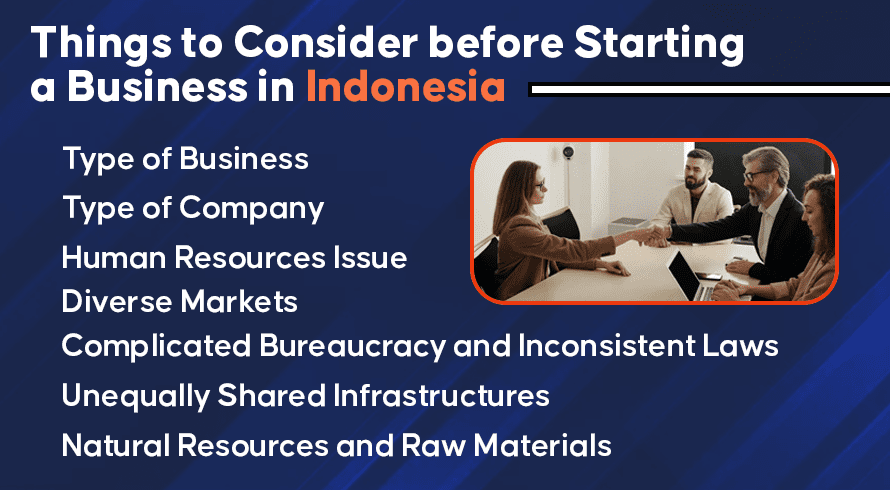Inquivix HQ
1-903, 18 Eonju-ro 146-gil,
Gangnam-gu, Seoul, Korea
06057

Are you looking to start a business in Indonesia? If so, you’re in for a treat! This country is one of the most lucrative places to do business in Southeast Asia. However, there are a few things you should know before you get started. We’ll cover topics such as registering your company, obtaining permits and licenses, and hiring employees.
About the Indonesian Market
Indonesia is one of the emerging markets in Southeast Asia. It is the largest economy in the region and has a population of over 260 million people. The country offers ample opportunities for businesses, with stable economic growth and a young population. There are also several free trade agreements that provide access to markets in ASEAN, China, Japan, South Korea, and India.
Country Profile
Indonesia is a beautiful country located in Southeast Asia located on the world’s major trade routes. The people are friendly and the culture is rich with tradition. The economy is growing rapidly and there are many opportunities for investment. Indonesia has a young population and a thriving middle class. The infrastructure is improving, making it easier to do business in Indonesia. There are many talented workers available, and the cost of doing business is relatively low. Indonesia offers a great opportunity for investors looking to expand into Southeast Asia.
Society and Culture
Indonesia is a country with many cultures, religions, and traditions. There are many festivals celebrated in Indonesia, each with its own unique flavor. The people of Indonesia are warm and welcoming, always willing to help a stranger. They are very proud of their culture and heritage and love to share it with others.
Language and Religion
The official language is Bahasa Indonesia, which is similar to Malay spoken in Malaysia. English, on the other hand, is widely used in Jakarta and tourist areas like Bali, as well as many other major cities, particularly for business.
Indonesia is the world’s most populous Muslim country and the official religion is Islam. However, Indonesia has a long history of religious tolerance and there are many other religions practiced in the country, including Hinduism, Buddhism, Christianity, and Confucianism.
Values, Customs, and Celebrations
The five pillars of Indonesian nationhood are said to be founded on centuries-old customs. They are the belief in the existence of a single and only God, just and civilized humanity, the unity of Indonesia, democracy guided by the wisdom of representatives, and social justice for all Indonesians.
Many Indonesian customs and holidays reflect these values. For example, the Muslim Eid al-Fitr festival marks the end of Ramadan, a month of fasting and prayer. Families come together to celebrate with special foods, gifts, and prayers. Another important holiday is Galungan, which celebrates the victory of good over evil. Chinese New Year and Indonesia’s Independence Day are two notable events (17th August). The Birth of the Buddha, Balinese Hindu New Year, and Christmas Day are all observed and made official holidays in true Indonesian style.
Working Practices and Values
Being on time is important to your Indonesian counterparts. However, as traffic can be busy, especially in key cities, it’s a good idea to build in extra time when making appointments. In Indonesia, people respect status and rank. They are loyal to the groups they belong to. For example, employees will do what their bosses tell them to do. Older people are respected more than younger ones. It is very important for overseas investors to have a local partner. This partner can help you with many things, such as dealing with government officials and talking to company representatives.
Investment and Trade
The Indonesian economy is the largest in Southeast Asia and is the 16th largest in the world. It has a GDP of $951 billion and a population of over 260 million. The country’s economic growth rate has averaged over five percent in recent years, making it one of the most promising emerging markets in the world.

Despite being one of the world’s greatest reformers, as determined by the World Bank, Indonesia’s rankings in terms of trading across borders, starting a business, enforcing agreements, and registering property are lower than those of other competitive Asian countries. Despite this, the Indonesian government hopes to increase investment and trade through its reform program. It has done so by deregulation and reducing the number of permits needed by investors in order to reduce administrative hurdles.
Ease of Doing Business
According to the World Bank, Indonesia has most recently changed its business laws in the last decade, with eight modifications since 2003. When it comes to starting a company in Jakarta, the country’s capital, it will now take you 22 days rather than 180 or more as previously.
However, further changes are necessary. The process of establishing a new firm is complex, taking 11 steps compared to just five in high-income countries.
Foreign Investment
Foreign investment in Indonesia is regulated by Law Number 25 of 2007 on Foreign Investment (“F.I.L”). The F.I.L allows foreign investors to invest in almost any sector of the Indonesian economy, with a few exceptions listed in Article 12 of the F.I.L.
Indonesia’s appeal for foreign investors is obvious. This is a very large market. Indonesia has a huge number of working-age individuals. The population is projected to grow by another 30 million in the next decade. This growth creates opportunities for investors in a range of industries, including manufacturing, consumer goods, mining, natural resources, and services such as tourism and transportation.
Government Incentives
The Indonesian government has been making efforts to improve the investment climate in recent years. Indonesia’s Investment Coordinating Board (BKPM, or Badan Koordinasi Penanaman Modal) now acts as a gateway for many government incentives and activities. The government has certainly expanded the number of industrial sectors in which foreign investors can invest money, including logistics, the digital economy, energy, pharmaceuticals, movie production, and tourism.
Capital Markets and Banking
The Indonesian stock market has benefited from positive sentiments regarding the Indonesian economy, with the government working hard on changes such as removing fuel subsidies. Foreign investors are now able to invest more in Indonesian companies, with the removal of foreign ownership caps. The banking sector is also growing and becoming more sophisticated, offering a wide range of products and services to meet customer needs. Foreign direct investment continues to be an important contributor to Indonesia’s economy. Thanks to the country’s positive business environment and strong economic growth Indonesia is progressing towards a lucrative business opportunity capital markets and banking.
Intellectual Property Rights
Indonesia is a member of the World Trade Organization (WTO), and it has joined the Agreement on Trade-Related Aspects of Intellectual Property, more commonly known as the TRIPs Agreement. Indonesia has also committed to joining the Paris Convention. The country is attempting to align its intellectual property regulations with worldwide norms.
However, protection is still an issue, and it’s especially concerning when it comes to safeguarding intellectual property rights. There’s also a lack of public awareness and enforcement. Keeping track of infringements in such a huge country as Indonesia is difficult.
Reasons to Do Business in Indonesia
Indonesia is the world’s fourth-largest country by population and the largest economy in Southeast Asia with significant regional autonomy. It has a young, vibrant population of over 250 million people and a GDP of $860 billion. Indonesian businesses are well-positioned to take advantage of this growing market.
Indonesia’s Free Trade Agreements
Indonesia has many free trade agreements (FTAs) in place with various countries and blocs. This makes it easier for Indonesian businesses to export their products and services to these markets, as tariffs and other barriers are reduced or eliminated. The FTAs also provide opportunities for foreign entrepreneurs looking to do business in Indonesia.
Indonesia has trade connections with several countries outside ASEAN, including India, China, South Korea, Japan, Australia, and New Zealand. Indonesia is an excellent epicenter for cross-border trade in Southeast Asia due to its lengthy list of partnerships.
Official Business Language Is English
There are more than 700 different languages and dialects spoken in Indonesia, the official language being Bahasa Indonesian. There are approximately 270 distinct spoken dialects in Papua, alone. Officially, however, Indonesian is the only business language in Indonesia. This alleviates foreign company owners’ difficulties with language barriers and enables them to enter the market more easily. However, if businesses wish to sell their items in Indonesia, they must first ensure that their marketing is tailored to the market.
Indonesia’s Growing Economy
Indonesia is Southeast Asia’s largest economy and it continues to grow rapidly. In 2017, the country’s GDP was $US840 billion, making it the 16th largest economy in the world. The Indonesian government expects that number to increase in the coming year. This growth is being driven by a young population and rising consumer demand. The country is also benefitting from increased investment and a growing tourism industry. While there are some challenges, such as the high levels of poverty and inequality, Indonesia’s economy is on track to continue its rapid growth in the years ahead.
Indonesia Is a “Young” Country
Between 1971 and 2010, Indonesia’s population nearly doubled. Indonesia’s median age is 31.1 years old. A country with the majority of its people under the age of 30 has a lucrative business potential for the future. As the general public grows older, it becomes more used to contemporary business methods. A nation full of youngsters also implies an increase in educated, talented individuals. In the future, when foreign firms wish to employ personnel in Indonesia, they will have a larger selection of people to pick from.
Indonesia Has a Growing Middle-Class
Indonesia is a thriving democracy with a growing middle-class. The country has been experiencing strong economic growth in recent years, and this is helping to drive up standards of living for the Indonesian people. There are now millions of Indonesians who enjoy a high quality of life, thanks in part to the many opportunities that are available in the country. Indonesia is also a very diverse nation, with dozens of different cultures and religions represented. This makes it an interesting place to live, and it attracts many foreigners who are looking for an exotic experience. If you’re thinking about moving to Indonesia, be sure to check out all the amazing things this country has to offer!
Things to Consider before Starting a Business in Indonesia
If you’re thinking about starting to enter the Indonesian market, there are a few things you should consider first. The Indonesian market is growing rapidly and offers many opportunities for businesses of all sizes. However, there are also several challenges that businesses must overcome to be successful in Indonesia.

The International Trade Administration (ITA) has put together a list of the top things to consider before starting a business in Indonesia. This includes things like understanding the local business culture, complying with local regulations, and finding qualified employees.
Type of Business
The first thing you need to consider is the type of business you want to start. There are many options, but some of the most common ones include trading goods and services, setting up a manufacturing operation, or establishing a tourism-related venture.
Some companies are not allowed or only have limited permission for foreign investment. The Negative Investment List contains the list. Some sectors limit foreign ownership from 0% to 95%. However, some businesses are allowed to be entirely foreign-owned (100%).
Type of Company
When starting a business in Indonesia, there are several key factors to consider. The first is the type of company you want to establish. There are several different types of businesses available in Indonesia, including limited liability companies (PT), partnerships (CV), and sole proprietorships (UG). Each type has its own set of benefits and drawbacks, so it’s important to choose the right one for your business.
Human Resources Issue
Another important factor to consider is understanding the country’s human resources landscape. In Indonesia, there is a strong cultural emphasis on hierarchy and respect for elders, which can make negotiations and interactions with employees difficult. Additionally, labor laws in Indonesia are often complex and changeable, so it’s important to be aware of the latest updates before hiring or contracting any workers.
Indonesia is the fourth most populous nation on earth, with over 60% of the global population in their productive years (15-60 years old). However, not all of them have the required talents to participate in industrial and commercial activities.
Diverse Markets
The country is home to a diverse array of cultures and markets, so it’s important to do your research beforehand and identify the right opportunity for your venture. Additionally, there are several regulatory hurdles you’ll need to clear to establish and operate a company in Indonesia.
Indonesia is the largest archipelago nation on Earth, as well as the most complicated and divided market. Because of all of the different races, languages, religions, customs, and values in Indonesia, you can’t treat it as you would treat a regular market. Each segment of the target market will have different needs, wants, and spending power.
Complicated Bureaucracy and Inconsistent Laws
Complicated bureaucracy and inconsistent laws are just some of the challenges that Indonesian businesses face when trying to operate in this country. One government agency may require one set of paperwork, while another agency may require something completely different. This inconsistency can be extremely frustrating and often leads to wasted time and money. In addition, the rules and regulations seem to change. Therefore, a business needs to be on the constant lookout for these.
Unequally Shared Infrastructures
Unequal access to infrastructure limits the potential of Indonesian businesses. While major cities have extensive development in the infrastructure, some of the islands are still showing underdeveloped or poor infrastructure. Despite being the world’s fourth most populous country, Indonesia ranks 108th out of 188 countries in terms of infrastructure development, according to the World Economic Forum’s 2017-2018 Global Competitiveness Report. This lack of infrastructure hampers economic growth and creates a competitive disadvantage for any business entering the Indonesian market.
Natural Resources and Raw Materials
Indonesia is a country that can boast of extensive natural resource wealth. the archipelago has extensive reserves of coal, oil and gas, gold, copper, and other minerals. Indonesian companies have been able to capitalize on this wealth by mining and exporting these commodities. However, there are challenges facing the sector due to regulatory uncertainty and infrastructure constraints.
Conclusion
Operating a business in Indonesia can be both challenging and rewarding. There are a number of things to consider before starting up your business in this market. So, if you’re looking to start a business in Indonesia, make sure you do your research and understand the unique challenges and opportunities that come with operating in this market. With careful planning and execution, however, there’s no reason why your business can’t thrive in one of the world’s most exciting economies!
